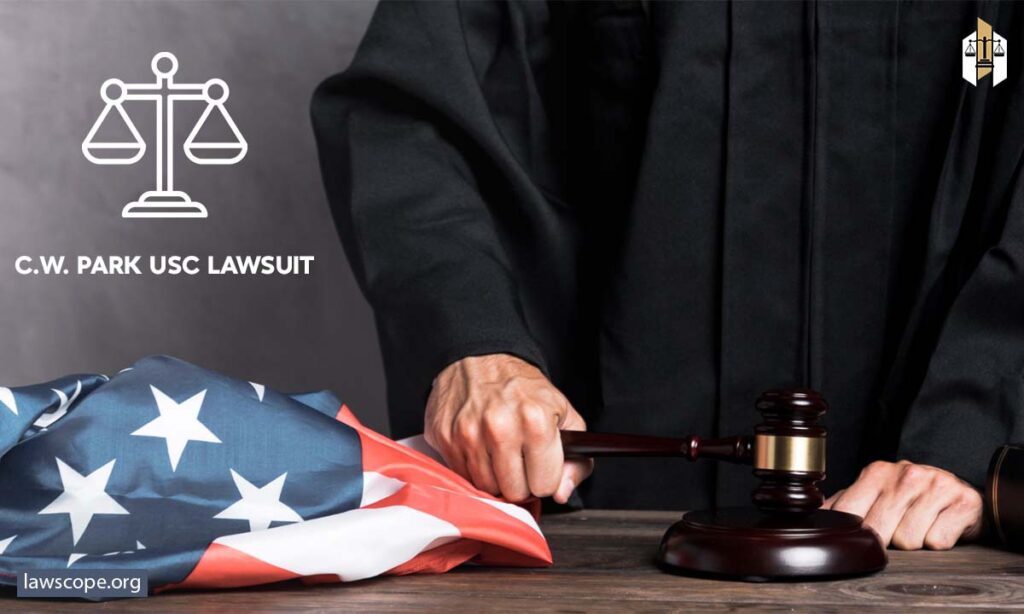
In the realm of higher education, controversies, and legal battles occasionally emerge, casting a shadow over prestigious institutions. One such recent saga involves C.W. Park and the University of Southern California (USC). This lawsuit has captured the attention of both legal enthusiasts and the general public alike. In this blog post, we’ll delve into the intricacies of the C.W. park USC lawsuit, examining its origins, the legal arguments presented, and the potential impact on the university and beyond.
What is C.W. park USC Lawsuit?
The C.W. Park USC lawsuit revolves around a former student, C.W. Park, who has taken legal action against the University of Southern California (USC), alleging various instances of misconduct during his time on campus.
The lawsuit, filed within a specified timeframe relative to the alleged incidents, encompasses a range of allegations, including discrimination, harassment, and violations of Title IX.
At its core, Title IX is a federal law prohibiting sex-based discrimination in education. C.W. Park asserts that USC failed to adequately address reported cases of sexual harassment and discrimination, thereby violating his rights under Title IX.
The legal action also involves claims of negligence, intentional infliction of emotional distress, and breach of contract, pointing to a breakdown in the duty of care owed by the university to its students.
The lawsuit not only has financial implications for USC but also carries the potential to impact the university’s reputation.
Moreover, the case is situated within the broader context of a national conversation about campus safety, prompting discussions about how universities handle allegations of misconduct and the measures they have in place to create safe and inclusive environments for their students.
As the legal proceedings unfold, the c.w. park usc lawsuit raises critical questions about the responsibilities of educational institutions in addressing issues of discrimination and harassment.
Background
The story begins with C.W. Park, a former student at USC, who filed a lawsuit against the university, alleging various misconduct and violations during his time on campus.
The specifics of the allegations vary, but they generally encompass issues related to discrimination, harassment, and the university’s response to reported incidents.
As the legal battle unfolds, it raises questions about USC’s policies and practices and the broader challenges universities face in handling such sensitive matters.
Legal Grounds
C.W. Park’s lawsuit against USC is multi-faceted, involving several legal grounds.
One prominent aspect revolves around allegations of Title IX violations.
Title IX is a federal law that prohibits discrimination based on sex in education programs and activities.
In this context, C.W. Park asserts that USC failed to adequately address instances of sexual harassment and discrimination, thereby violating his rights under Title IX.
The lawsuit also touches upon issues of negligence, intentional infliction of emotional distress, and breach of contract.
These claims suggest a breakdown in the duty of care owed by the university to its students, as well as a failure to uphold the terms and conditions outlined in its agreements with students.
The combination of these legal arguments paints a complex picture of the alleged misconduct and the legal remedies sought by C.W. Park.
Impact on USC
As the legal battle unfolds, USC faces not only potential financial repercussions but also reputational challenges.
In an era where universities are under increasing scrutiny for handling misconduct cases, the outcome of the lawsuit could significantly influence the public perception of USC.
A favorable verdict for C.W. Park might signal a need for universities to reassess their policies and practices in dealing with issues of discrimination and harassment.
The impact is not limited to USC alone; it extends to the broader academic community.
Other universities may closely monitor the developments of this case to proactively address any potential shortcomings in their policies.
The lawsuit serves as a stark reminder that educational institutions must prioritize the safety and well-being of their students, ensuring that their campuses are free from discrimination and harassment.
The Broader Context
The C.W. park usc lawsuit also unfolds against the backdrop of a broader national conversation about campus safety and the #MeToo movement.
Incidents of sexual harassment and assault on college campuses have gained increased attention in recent years, prompting universities to reassess and strengthen their policies.
The legal proceedings in this case may set precedents that influence how future cases are handled and how universities across the country approach issues of discrimination and misconduct.
Navigating The Challenges
One of the challenges highlighted by the c.w. park usc lawsuit is the difficulty universities face in balancing the rights of the accuser and the accused.
Striking this balance requires a nuanced approach that acknowledges the gravity of the allegations while also ensuring fair and impartial investigations.
As universities grapple with these challenges, they must continually refine their processes to create environments that foster accountability and safety for all students.
Lessons For Other Universities
The legal drama at USC serves as a cautionary tale for other universities, emphasizing the importance of proactive measures to prevent and address misconduct.
Institutions of higher learning must regularly review and update their policies, providing comprehensive training for staff and students on issues of discrimination, harassment, and reporting procedures.
Open communication channels and a commitment to fostering a culture of respect are essential elements in creating a safe and inclusive campus environment.
Discover More: Barrister vs Solicitor: Understanding Legal Roles And Differences
Frequently Googled Questions About The C.W. park USC Lawsuit
This litigation has piqued the interest of both legal experts and the general public.
In this blog post, we’ll deconstruct the C.W. Park USC case, looking at its origins, legal arguments, and potential impact on the university and beyond.
here are some frequent Google questions about c.w. park usc lawsuit:
1. What Are The Specific Allegations in The C.W. park USC lawsuit?
C.W. Park alleges various misconducts, including discrimination, harassment, and Title IX violations during his time at USC.
The lawsuit claims that the university failed to adequately address instances of sexual harassment and discrimination, violating Title IX rights.
It also includes allegations of negligence, intentional infliction of emotional distress, and breach of contract.
2. When Was The C.W. Park USC Lawsuit Filed?
The exact filing date can be obtained from official court records, as it may vary.
However, as of, 10/11/2023 the lawsuit was filed within a certain timeframe relative to the alleged incidents.
Refer to official legal sources for the most accurate and up-to-date information.
3. What Potential Consequences Does USC Face If The Lawsuit is Successful?
If the lawsuit is successful, USC could face financial repercussions through damages awarded to C.W. Park.
Additionally, the university’s reputation may be affected, leading to increased scrutiny and potential changes in policies and procedures related to campus safety and the handling of misconduct cases.
4. How is Title IX Relevant To The C.W. Park Lawsuit Against USC?
Title IX is a federal law prohibiting sex-based discrimination in education.
C.W. Park’s lawsuit invokes Title IX, claiming that USC’s alleged mishandling of reported incidents constitutes a violation of this law.
Title IX requires educational institutions to promptly and appropriately address complaints of sexual harassment and discrimination to ensure a safe and nondiscriminatory environment.
5. What Broader Impact Could The C.W. Park USC Lawsuit Have on Universities Nationwide?
The lawsuit may set precedents for how universities handle similar cases in the future.
A successful outcome for C.W. Park might prompt other institutions to reevaluate and strengthen their policies, training programs, and response mechanisms related to discrimination and harassment.
It could contribute to a broader conversation about the importance of campus safety and the need for proactive measures in higher education.
May You Like Also: Law Firm SEO Strategies: Boost Your Online Presence
Conclusion
The C.W. Park USC lawsuit shines a spotlight on the challenges universities face in addressing allegations of discrimination and harassment.
As legal proceedings continue, the case prompts a reevaluation of policies and practices within USC and raises broader questions about the state of campus safety nationwide.
The lessons learned from this legal saga can catalyze positive change, inspiring universities to create more robust systems for preventing and addressing misconduct, ultimately fostering safer and more inclusive academic environments.
You May Like Also:


16 thoughts on “C.W. Park USC Lawsuit: Unveiling The Legal Battle and Its Impact”